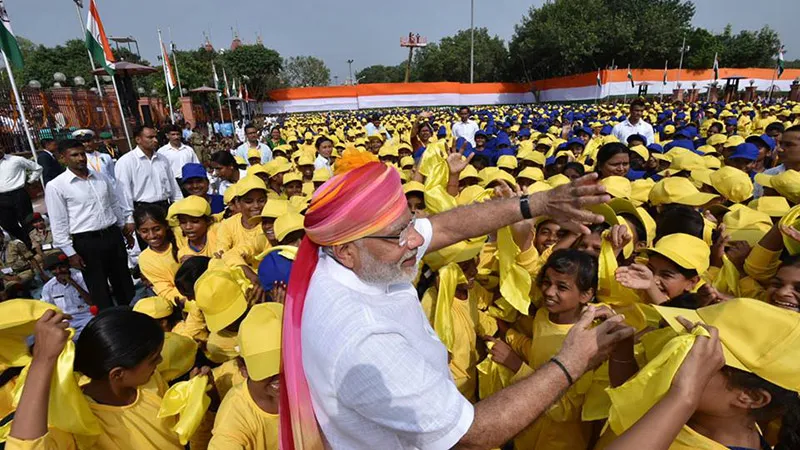-
CENTRES
Progammes & Centres
Location

When the dust settles, Prime Minister Narendra Modi's Independence Day speech on August 15 will go down in the annals of Indian foreign policy as a watershed event. By implicitly calling Pakistan’s extant territorial claims into question — Balochistan makes for more than 40 percent of that country's landmass — Prime Minister Modi has brought a new and bold thrust to India’s unfortunately middling — and often muddled — Pakistan policy.
Analysts thrive on turning points — Modi's speech been no different. < class="aBn" tabindex="0" data-term="goog_1178544428">< class="aQJ">Tuesday morning's newspapers have also included voices opining that by drawing Balochistan to the already-volatile geopolitical mix, India runs the risk of scoring tactical victories at the risk of sacrificing its grand strategy of regional stability. It has also been suggested that New Delhi — by upping the ante in Balochistan — could take its eye of the real challenge, Kashmir. These are well-meaning and informed voices. Nevertheless, they are mistaken on both counts. India’s Balochistan strategy could indeed become what dissuades Pakistan from further fuelling the Kashmir crisis. It could also be designed in a way that the “nuclear stakes,” as one analyst called them, are annulled. As argued in this piece, the contours of India’s strategy in Balochistan will be drawn by both diplomatic, as well as, covert means to deter Pakistan from further adventurism in Kashmir and elsewhere in India. The operative word here is ‘deterrence’. Simply put: India need not actually embark on a programme to dismember Pakistan. A credible threat — that it could do so at will if it chooses to — would do. The credibility of the threat would, in turn, depend on actual, selective and small-scale support for Baloch proxies. The ongoing insurgency in Kashmir — and there is no other word to describe what is going on — has two components: an indigenous one fuelled by local grievances, real and imagined, as well as a politico-strategic one, driven by Pakistan’s grand strategy. Without the latter, the former is reduced to a pure internal-security issue. Indeed removing Pakistan from the picture is what is needed to reduce Kashmir to a version of ‘Naxalism Plus’, to be addressed by an appropriate stick-and-carrot mix. Pakistan has long worked on the assumption that its nuclear weapons are what would prevent India from launching an all-out conventional attack in response to its intransigence. There is nothing that stops India from leveraging the same logic (moral quandaries aside). Indeed Ajit Doval, the National Security Advisor (NSA), has long maintained that sub-conventional dominance — proxy wars or the threat thereof — may be the only route for states to jostle each other under the nuclear overhang. A year ago, NSA Doval delivered a remarkable speech in Mumbai. In his Lalit Doshi Memorial Lecture, he spoke of “the mechanism of covert war, the proxy war you are fighting against someone, using somebody else’s manpower and weapons.” As an example, Doval spoke of the American support of Afghan mujahideens through Pakistan. It would utterly insulting to the intelligence of KGB officers posted in the region to presume that they had no inkling that American-sourced weapons were being used to shoot down their helicopters and fixed-wing aircrafts. Yet, the Cold War — albeit by then in its death throes — remained cold. Historical examples like these show that covert wars under the nuclear overhang can indeed be stable, an instance of the “stability-instability paradox” nuclear strategists speak of. How does this apply to mitigating the Kashmir headache? A credible threat which seeks to deter by punishment — “you do another Mumbai, you lose Balochistan,” to use Doval’s memorable phrase on another occasion — would most definitely put Pakistan on the back foot, especially when its army is overstretched with its own counter-terrorism programme “Operation Zarb-e-Azb.” The capacity of the Pakistani state is vastly limited, a weakness that could be utilised by India with telling impact. As much as Pakistan postures its support for Kashmir, without Balochistan it will indeed be reduced to a version of “Greater Punjab and Sindh.” It is highly unlikely that it would continue its support for Kashmiri terrorists at the risk of yet-another dismemberment. The long game for India would be to keep Pakistan distracted with Balochistan enough for the Pakistanis to deploy the same proxies it uses to prosecute its Kashmir agenda there. (Pakistan, already facing international pressure for the excesses of its military in Balochistan, will almost certainly use proxies to neutralize the Balochi insurgency so as to avoid an international diplomatic blow-back.) The likes of JeM, LeT and Harkat tied up in Balochistan will significantly weaken these groups — and the capacity of Inter-Services Intelligence. But an important part of a coercive strategy is also a clever use of soft measures, predominantly diplomatic, something Doval alluded to in his Doshi Memorial Lecture. He said: “If I want you to hate everything, I want you to be ashamed of your culture and civilisation and if I achieve that, I win the battle.” Indeed the PM’s reference to the ‘glorification of terrorists’ in Pakistan yesterday exactly set out to do so. But at the end of the day, the simplest path for India do walk down would be to create a convincing illusion that it is indeed behind everything Pakistan has accused it to do. This manipulation of uncertainty — for in a well-designed proxy war, there is no way of convincing establishing responsibility — would be an important part of deterring Pakistan with Balochistan. This commentary originally appeared in Firstpost.The views expressed above belong to the author(s). ORF research and analyses now available on Telegram! Click here to access our curated content — blogs, longforms and interviews.

Shachi Adyanthaya Portfolio Manager Childrens Investment Fund Foundation
Read More +